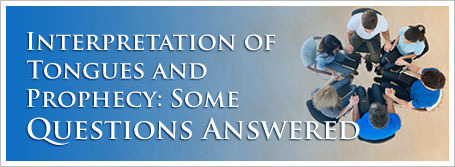I Corinthians 12:8-10 lists nine distinct manifestations, or evidences, of the gift of holy spirit. By their nature, the nine manifestations divide into three groups with three specific manifestations in each group. One group is the inspirational, or worship, manifestations, and it includes speaking in tongues, the interpretation of tongues, and prophecy. This article answers some questions about the manifestations of interpretation of tongues and prophecy.
What does the Bible mean when it refers to the interpretation of tongues and prophecy?
As the name suggests, the interpretation of tongues is operated alongside the manifestation of tongues, also called speaking in tongues. In the Church, when a believer speaks in tongues and interprets, he or she brings forth a message directly from God to the body of believers present. The message, given in the language of the majority of the people, is the sum and substance of what the believer has just spoken in an unknown language. If someone speaks in tongues in the Church—that is, in a fellowship meeting of born-again believers—that same person must also believe to interpret.
I Corinthians 14:13:
Wherefore let him that speaketh in an unknown tongue pray [believe] that he may interpret.
When a believer operates the manifestation of prophecy, he or she also brings forth a message directly from God to the body of believers present. Like the interpretation of tongues, the message is given in the language of the majority of the people. Both the interpretation of tongues and prophecy are inspired utterance given to the born-again believer by God via the gift of holy spirit within that believer. They are basically equal.
Who has the ability and authority to operate these manifestations?
Every spirit-filled believer has the privilege and responsibility of evidencing, or manifesting, the gift of holy spirit in the Church for the benefit of all (I Corinthians 12:7). Everyone who is born again of God and thus filled with the gift of holy spirit has the potential to operate the manifestations, including interpretation of tongues and prophecy.
When and where is it appropriate for tongues with interpretation and prophecy to be manifested?
I Corinthians 14 explains in detail the proper use of the worship manifestations. How do we know if this explanation is important for us to know today? By finding out to whom the Book of I Corinthians is addressed.
I Corinthians 1:1,2:
Paul, called to be an apostle of Jesus Christ through the will of God, and Sosthenes our brother,
Unto the church of God which is at Corinth, to them that are sanctified in Christ Jesus, called to be saints, with all that in every place call upon the name of Jesus Christ our Lord, both theirs and ours.
I Corinthians was written to the saints in every place, namely those who call upon the name of Jesus Christ our lord. We who call upon the name of Jesus Christ as our personal lord and savior find that I Corinthians is written to us as well as to those in Corinth. Thus, the instruction in chapter 14 regarding the proper use of the worship manifestations is addressed to the believers in the Church. The interpretation of tongues and prophecy are to be operated in the Church.
I Corinthians 14:3 says, “But he that prophesieth speaketh unto men….” The one speaking forth the word of prophecy is speaking unto men, plural—that is, to at least two other people. Therefore, these worship manifestations are properly operated when believers are gathered in groups of three or more.
What is the purpose of having the worship manifestations operated in a meeting of believers?
God’s Word tells us in I Corinthians 12:7 that all nine manifestations are profitable. We learn in chapter 14 that the worship manifestations are operated in order to edify, exhort, and comfort the body of believers.
I Corinthians 14:3-5,12,26:
But he that prophesieth speaketh unto men to edification, and exhortation, and comfort.
He that speaketh in an unknown tongue edifieth himself; but he that prophesieth edifieth the church.
I would that ye all spake with tongues, but rather that ye prophesied: for greater is he that prophesieth than he that speaketh with tongues, except he interpret, that the church may receive edifying.
…seek that ye may excel to the edifying of the church.
…Let all things be done unto edifying.
God wants us to be edified. In verse 3 “edification” means the act of building people up by way of exhortation and comfort. “Exhortation” is appealing to people in a manner of instruction or entreating. To “comfort” is to speak tenderly or with a soft voice so as to heal the hurts and wounds. When we properly manifest the interpretation of tongues and prophecy in a believers’ meeting, we are building up those who hear the words from God, we are exhorting, and we are healing hurts and wounds. And when we hear the worship manifestations, we can receive edification by way of exhortation and comfort.
God’s will for the Church regarding spiritual matters is concisely stated in I Corinthians 14:40: “Let all things be done decently and in order.” God’s Word teaches us how to operate the manifestations of holy spirit decently and in order, and when we do this, we build up the body of believers.
It is the privilege and responsibility of every born-again believer to carry out the instruction God has given us and to manifest the gift of holy spirit for the benefit of the Church. What an awesome privilege and responsibility we have!
The Way of Abundance and Power class series teaches interested Biblical students about all nine manifestations of holy spirit and HOW to operate them. Start your journey in the way of abundance and power today by visiting the Contact Us page to learn more about classes in your area.

